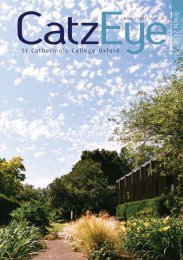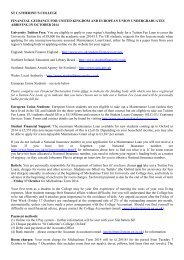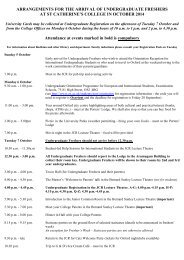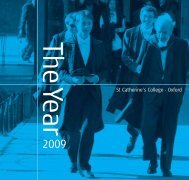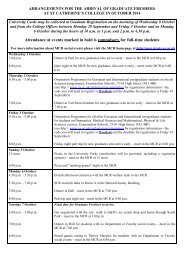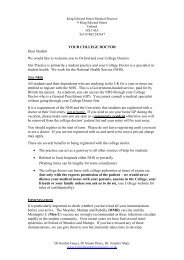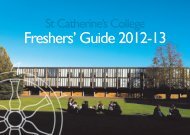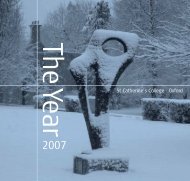Download PDF - St. Catherine's College
Download PDF - St. Catherine's College
Download PDF - St. Catherine's College
- No tags were found...
You also want an ePaper? Increase the reach of your titles
YUMPU automatically turns print PDFs into web optimized ePapers that Google loves.
ALUMNI NEWSJack Douay (1946, Agriculture and Forestry Science)I was sixteen years old when – in response to itsinvasion of Poland – France and the United Kingdomdeclared war on Germany. Born in London, of anEnglish mother and French father, I had dual nationality.We lived in the Avenue Montaigne in Paris, in a flatnext to the stables and exercising yard of our familyhorse-dealing business which, created by my greatgrandfatherin the middle of the nineteenth century,could stable up to 100 horses. The start of the warbrought our business in Paris to an end, as all ourhorses were requisitioned by the Army. As my parentswere close to sixty, they decided to remain in oursummer house in Carteret, just south of Cherbourg,where everyday life was easier than in the capital. I,therefore, returned to my studies in a very temporaryschool put together in Normandy to cope with theexceptional influx of the children of parents whohad decided not to return to winter in Paris.By early June 1940, the German Blitzkrieg had sweptthrough northern France. The British ExpeditionaryForce had managed to save a large number of menat Dunkirk, and everyone hoped that the French armywould be able to halt the invasion somewhere aroundthe Loire. On 16 June 1940, I turned seventeen. In viewof the proximity of the Germans my father wiselydecided to drive me and my bicycle 100 kilometressouth to Avranches, close to the Mont <strong>St</strong> Michel Bay, inorder to give me more freedom of movement to act inaccordance with day-to-day developments. By 17 Junethings had moved very quickly. The French Army hadcollapsed, and Maréchal Petain asked the Germans foran armistice. It was too late to hope for a halt in theGerman advance, and German forces quickly occupiedmost of France. For me, it was now either a matter ofstaying under German occupation or trying to escapeto some place where resistance was still possible.On 18 June, I cycled westwards on small roads for about100 kilometres, keeping clear of the German armouredtroops that were heading for Brest to get hold of theFrench fleet, and eventually reached the northerncoast of Brittany at Val André, where I had some friends.As the Germans had not yet had time to occupy all theports, I was able, in the early hours of the morningon 20 June, to board a small fishing boat returning toBoulogne. After twelve hours crossing a very rough sea Iarrived in <strong>St</strong> Helier, in Jersey. Those of the islanders whowished to leave were being evacuated to England in avariety of boats and I soon found myself in the bottomof a small empty tramp – normally full of cement –which arrived in Weymouth the next morning.Relatives in Eastbourne welcomed me kindly and,while trying desperately to find some way of tellingmy parents where I was (despite the fact that allcommunications between the UK and France werenow cut), I found renewed hope in the Churchillianatmosphere of the UK. I found a variety of jobs to earnmy keep, and learnt to adapt my mother’s VictorianI foundrenewedhope in theChurchillianatmosphereof the UK.ST CATHERINE’S COLLEGE 2008/41



